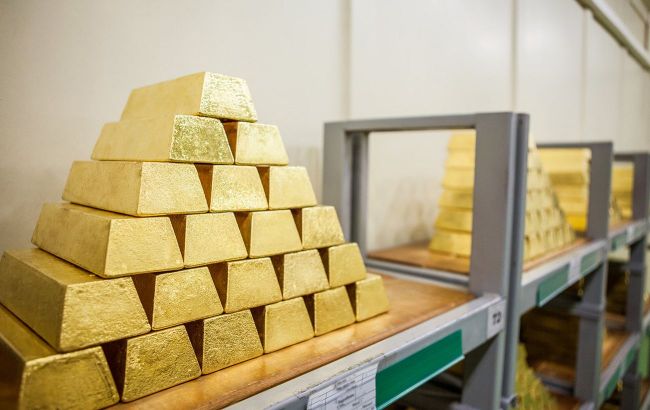Russian gold reserves rapidly sold off to support collapsing ruble
 The country's gold reserves (Illustrative photo: Getty Images)
The country's gold reserves (Illustrative photo: Getty Images)
Russia has begun rapidly selling off its gold reserves to patch budget gaps and support the ruble, indicating a fast depletion of its strategic stockpiles, Ukraine's Foreign Intelligence Service reports.
It has become known that the Central Bank of Russia, which previously systematically accumulated gold reserves, has now begun selling the precious metal to banks, state-owned companies, and investment structures.
This means that the economic pressure Russia faces due to sanctions and isolation is so severe that, for the first time in many years, Russia has begun "eating through" its strategic reserves.
Until 2025, the Russian Central Bank did not sell gold to commercial entities, receiving it mainly from the Ministry of Finance. However, a sharp liquidity squeeze is forcing the regulator to change its approach. At the same time, the National Wealth Fund is rapidly shrinking: from 113.5 billion dollars in 2022 to only 51.6 billion dollars in 2025. Gold reserves in the fund decreased by 57% during this period — from 405.7 tons to 173.1 tons.
According to forecasts, in 2025, Russia may sell up to 30 billion dollars' worth of gold (around 230 tons), and in 2026, at least another 15 billion dollars (115 tons).
Such large-scale monetization of the precious metal effectively turns it into a resource for patching budget gaps, supporting corporate liquidity, and preventing the ruble from collapsing.
At the same time, experts warn that this strategy poses serious long-term risks, as gold is one of the few highly liquid assets over which Russia still retains complete control.
The sell-off of gold makes state finances extremely vulnerable. The depletion of reserves may significantly reduce the country's ability to conduct future currency interventions and maintain financial stability.
Sanctions against Russia
After Russia invaded Ukraine in 2022, the Russian oil sector faced sanctions, a sharp drop in exports to the EU, and a forced restructuring of logistics chains.
Due to the latest US sanctions targeting Russian oil companies, Vladimir Putin has begun considering an unpopular measure — raising taxes in Russia — which indicates significant problems in the country's economy.
Analysts and traders also forecast that, even after a peace agreement with Ukraine, Russia will not be able to return to the global oil market quickly.

